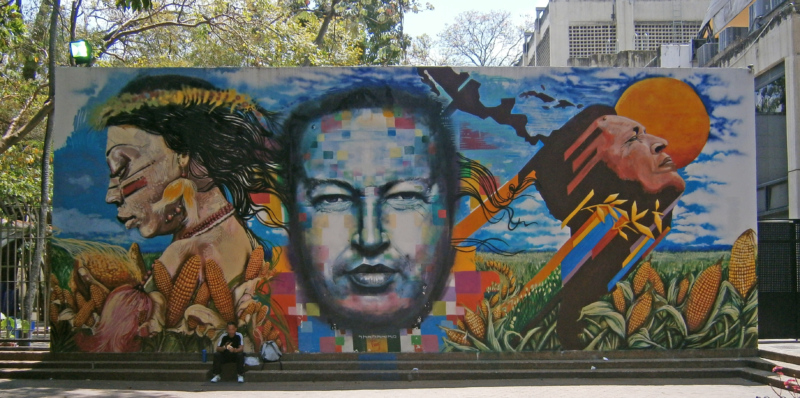Obama & Latin America: New Beginnings, Old Frictions
Today, signs of frustration are unmistakable in Washington and in many Latin American capitals, despite Obama’s immense personal appeal and the continued promise of a more productive partnership.
This post is also available in: Español
February 2nd marks two decades since Hugo Chavez first assumed the presidency of Venezuela. Today, the Bolivarian Revolution that Chavez led until his death in 2013 is at its most critical moment: the economy is in ruins, three million Venezuelans have emigrated in recent years, and his successor, Nicolás Maduro, rules as a dictator while Juan Guaidó took the oath as interim president with the support of the international community.
In this context, understanding Chavez’s legacy is fundamental to grasp the current situation.
First, Chavez put the social question at the center of the political agenda. By responding to the legitimate grievances of the poor, who had been excluded and ignored for decades, Chavez took advantage of the petroleum boom to undertake major social programs. After Chavez, most Latin American political figures gave greater emphasis to poverty and inequality in their political discourse, instead of focusing solely on macroeconomic stability. Social advances under Chavez were erased with the subsequent economic collapse, but even today Guaidó’s major challenge is to gain the support of those Venezuelans who reject Maduro but still remember Chavez fondly.
Second, Chavez presided over the gradual destruction of Venezuela’s democratic institutions. Taking advantage of his enormous popularity, Chavez restructured Venezuelan institutions to increase his power, promoted the cult of personality, took control of the judiciary, and harassed the opposition. Perhaps Maduro consolidated a dictatorship, but it was Chavez who had prepared the ground. Chavez’s Venezuela is a tragic example of how democracy can be destroyed from within, by elected leaders. The lesson applies to Russia, Turkey, and more and more Western countries.
Third, the economic model pursued under Chavez devastated the country’s economy. Gradually, Chavez nationalized practically the entire economy and delivered major companies (including the state-owned oil enterprise PDVSA) to politicians loyal to him as personal booty. The result was the collapse of production, an increase in corruption, the shortage of basic goods, higher levels of poverty and, finally, the gradual decline of petroleum production. In that sense, the “21st Century Socialism” that Chavez promoted ended up appearing much like the failed communist experiment of the 20th century: the “revolutionary” leaders enriched themselves while the population was more and more impoverished.
Fourth, Chavez politicized the armed forces. In 1999, when he assumed the presidency – and despite his own military background and career – Chavez was rejected by the armed forces, part of which attempted to overthrow him in a failed coup in 2002. After regaining power, Chavez purged the military, named many generals loyal to him and gave the armed forces control of a considerable share of the economy. With time, as research shows, that new Bolivarian military elite extended its influence and engaged in contraband and drug trafficking. It also became the principal pillar of support for Chavez and especially Maduro following the death of the leader. As a result, it is not surprising that today’s top military brass remains loyal to the regime, and that Guaidó is offering them an amnesty in an effort to bring them over to his side.
Fifth, Chavez offered a fresh and powerful voice opposing the United States in Latin America. Helped by the unpopularity and diplomacy clumsiness of the George W. Bush administration (especially the Iraq war), the Bolivarian leader blamed Washington for Latin America’s problems and helped revitalize a left in the region (and even globally) that had seemed to be exhausted after the end of the Cold War. Using the (ephemeral) petroleum wealth Chavez forged an alliance with leftist leaders in Ecuador, Bolivia, Nicaragua, and Caribbean countries, but the most important relationship was the one he established with Cuba: Chavez gave subsidized oil to the impoverished island and in exchange received Cuban doctors and strategic advice from the communist regime, which helped him consolidate the authoritarian government in Caracas. Chavez’s leadership and the shipment of cheap oil to his allies gave him crucial regional support, which for years stood in the way of any condemnation of Venezuela in the Organization of American States. Thanks to that legacy, part of the Latin American left still refuses to condemn the Maduro regime.
Just days before he became president in 1999, Hugo Chavez was interviewed by the Colombian writer and Nobel Laureate Gabriel Garcia Marquez, who largely sympathized with the left. Following the interview, Garcia Marquez noted that he had met two opposing men: “One to whom luck had offered the opportunity to save his country. And the other, an illusionist, who could go down in history as just one more despot.” Those words turned out to be prophetic: today, most Venezuelans want to be saved from Chavez’s ruinous legacy.
Today, signs of frustration are unmistakable in Washington and in many Latin American capitals, despite Obama’s immense personal appeal and the continued promise of a more productive partnership.
Despite continued tensions among the Andean countries, four U.S. ambassadors painted an encouraging picture of regional stability.
Even with loaded dice, Chávez may be running scared. What to do to preserve power? That’s all that has ever mattered.
 Wikimedia / CC0 1.0
Wikimedia / CC0 1.0